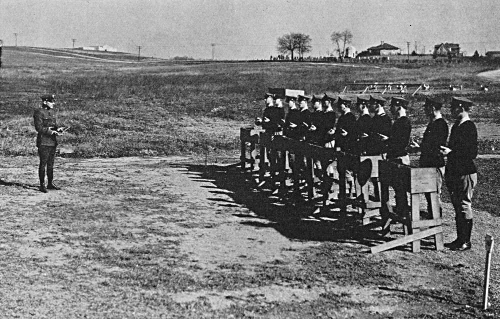The following information comes from Manual of Police Revolver Shooting by R. M. Bair. Manual of Police Revolver Instruction is also available to purchase in print.
FLINCHING is the most difficult obstacle or handicap for the officer to overcome while learning to become a good revolver shot. Flinching is an involuntary movement of the arm and shoulder muscles, causing tenseness at the time of firing and is very often accompanied by jerking the head and closing both eyes at the time of the flash, explosion and recoil.
Flinching is sometimes caused by carelessness or lack of concentration, but in most cases is caused by an unconscious fear of the flash, explosion and recoil at the time of firing the revolver. Very often, the shooter will unconsciously move his arm forward (tensing the muscles and nerves) to meet the recoil. The effect of flinching will cause wild shots on the target and very often a complete miss on a man-sized target at short range.
The officer can determine if he is flinching and to what extent, by loading several chambers in the cylinder with empty cartridge cases and several with loaded cartridges, giving the cylinder a spin and without looking to see the arrangement of the loaded cartridges in the cylinder close it. He should then start firing as though each chamber held a loaded cartridge and when the hammer falls on an empty, he will be able to see the degree to which he is flinching. This will show him how much the sights have been deranged or moved out of alignment with the target.
A very good method of overcoming flinching, is by properly squeezing the trigger and being able to call the location of the shot on the target, keeping both eyes open and seeing the alignment of sights at the time the hammer falls and before the revolver goes into recoil. In order to become a good revolver shot, the officer must learn to concentrate as quickly as possible on hold, squeezing the trigger and calling the shot at the time of firing.
As flinching is usually an involuntary action or the action of the sub-conscious mind telling the shooter to be afraid of the flash, explosion and recoil, he will have to guard against it with every precaution by concentrating on the proper methods of revolver shooting.

Flinching Quiz
- Define flinching?
- What causes flinching?
- What will be the effect of flinching at the time of firing?
- What methods can be used to overcome flinching?
- What is a good method for the officer to determine if he is flinching at the time of firing?
- How will flinching affect the accuracy of shots fired?
- Why is it so necessary for the officer to be able to call his shots at the time of firing?
- What causes flinching at the time of firing besides fear of the flash, explosion and recoil?
